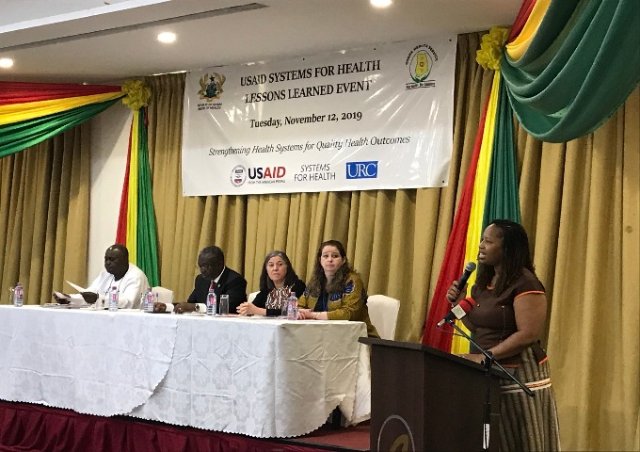 The United States of America, through the United States Agency for International Development (USAID) and the Ghanaian government have joined forces to advance health service delivery.
The United States of America, through the United States Agency for International Development (USAID) and the Ghanaian government have joined forces to advance health service delivery.
USAID officials joined dignitaries from the Ministry of Health (MOH) and the Ghana Health Service to celebrate collaborative efforts to improve the health of Ghanaians at the USAID Systems for Health learning event.
The project expanded evidence-based, high-impact interventions to prevent child and maternal deaths, increased family planning use reduced malaria-related morbidity and mortality, and improved the nutrition of pregnant women and young children.
In her remarks, USAID/Ghana Health Office Director, Janean Davis, highlighted the impact of this partnership.
“Through its broad and ambitious mandate across the Central, Greater Accra, Northern, Western, and Volta regions, the USAID Systems for Health project has touched the lives of countless individuals through innovative approaches that build upon Ghana’s health system.”
Since 2015, support from the United States of America contributed to a dramatic increase in the percentage of Ghanaian health facilities conducting skilled delivery.
The percentage of Community-based Health Planning and Services (CHPS) zones conducting deliveries in the Central, Greater Accra, Northern, Western, and Volta regions rose from 26 per cent in 2015 to 44 per cent in 2018.
Many more women and babies now have access to life-saving services, reducing maternal and morbidity.
This is just one of many contributions of the USAID Systems for Health project, which supported the Ghana Health Service to improve health service delivery by strengthening health systems vital to ensuring service access and quality.
Through USAID, the U.S. Government supported the Ghana Health Service to conduct trainings for health workers and facilitated focused ‘shared learning’ collaborative sessions where health workers visited other health facilities to share their experiences and skills and brainstorm practical solutions to entrenched health challenges.
“Shared learning” districts achieved impressive results, including a 42 per cent reduction in institutional maternal mortality; a 35 per cent reduction in stillbirths; and a 41 per cent increase in the number of people who accept family planning services.
Through its close work with the GHS, the USAID Systems for Health project revealed the positive effects of working with regions and districts to help managers and health workers identify solutions to health challenges by looking at data.
Realising the importance of community engagement for quality health services, the USAID Systems for Health project assisted regions and districts to make CHPS zones functional and revitalize their Community Health Management Committees.
The percentage of functional committees increased from 62% in 2015 to 97% in 2018.
USAID also supported the Ghana Health Service to build and equip 26 new CHPS compounds and renovate 50 health facilities in the Northern and Volta regions.
The project also built a pontoon boat to provide services to remote, hard-to-reach communities in the Volta Region.
The boat now allows health workers to reach isolated island communities safely and efficiently.
These new and renovated health facilities are now fully equipped, including a full maternity ward, ensuring life-saving services reach the doorsteps of communities.
Source: Graphic Online























